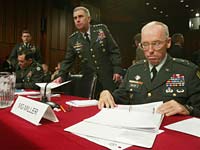While the Army Criminal Investigative Command investigates individual allegations of abuse, reports of such abuse of prisoners in Iraq, Afghanistan, and Guantanamo Bay have prompted the military and the Pentagon to conduct wider high-level investigations. Depending on how you count, as many as 10 reports have been commissioned by the military and the Pentagon. Broadly speaking, they have concluded that the abuses at Abu Ghraib and elsewhere are the fault of military policies or the lack thereof, as well as the acts of rogue soldiers. Yet the investigators have stopped short of leveling serious blame against high-ranking military and civilian officials like Defense Secretary Donald Rumsfeld; Lt. Gen. Ricardo Sanchez, former U.S. Commander in Iraq; Maj. Gen. Geoffrey Miller, former commander of the detention facility at Guantanamo; and Gen. Daniel McNeill, commander of allied forces in Afghanistan. Some investigations had a limited mandate. Others cleared top commanders of wrongdoing, noting that they lacked direct knowledge of the abuse. If there's a pattern in the reports, it's that the inquiries conducted soon after the abuses were uncovered are more bluntly critical of the higher-ups than the recent follow-up inquiries, which had greater authority to recommend punishment. Why so many commissions? Pentagon agencies and different military commands have initiated their own reports for their own reasons. For example, the secretary of defense appointed the Schlesinger Commission "to review DoD detention operations" and to "provide independent professional advice." Gen. Bantz Craddock of the U.S. Southern Command appointed Lt. Gen. Randall Schmidt to investigate accusations about mistreatment at Guantanamo made by FBI agents in internal memos released in response to an ACLU Freedom of Information Act request. The patchwork of investigations reflects the lack of a systematic response to the scandal. And why aren't commanders being held responsible for the acts of the lower-ranking officers and soldiers they supervised? The Pentagon would say that the inquiries and the reports they produced reflect the DOD's considered judgment about who should bear responsibility for Abu Ghraib and the other detention facilities, based on the evidence that was collected. Yet the findings in the Fay-Jones Report and the recent recommendations of Army Inspector General Stanley Green don't match up. And it's hard to ignore the conflict of interest that the military has in investigating its own misconduct, especially when the trail may lead to top commanders. Phillip Carter offers thoughts here and here in Slate about the unacknowledged problems inside the military that help account for the abuses. For a rundown of what the military and the Pentagon have to say for themselves click the reports on the left.Photograph of Ricardo Sanchez John Abizaid and Geoffrey Miller by Alex Wong/Getty Images. |
